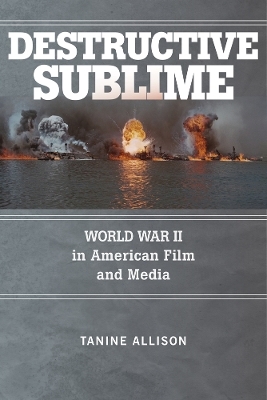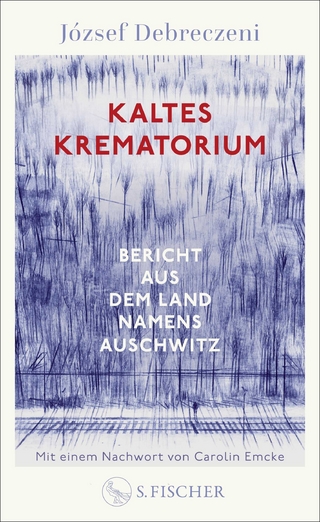
Destructive Sublime
World War II in American Film and Media
Seiten
2018
Rutgers University Press (Verlag)
978-0-8135-9749-2 (ISBN)
Rutgers University Press (Verlag)
978-0-8135-9749-2 (ISBN)
Traces a new aesthetic history of the World War II combat genre by looking back at it through the lens of contemporary video games like Call of Duty. Allison locates some of video games' glorification of violence, disruptive audiovisual style, and bodily sensation in even the most canonical and seemingly conservative films of the genre.
The American popular imagination has long portrayed World War II as the "good war," fought by the "greatest generation" for the sake of freedom and democracy. Yet, combat films and other war media complicate this conventional view by indulging in explosive displays of spectacular violence. Combat sequences, Tanine Allison argues, construct a counter-narrative of World War II by reminding viewers of the war's harsh brutality.
Destructive Sublime traces a new aesthetic history of the World War II combat genre by looking back at it through the lens of contemporary video games like Call of Duty. Allison locates some of video games' glorification of violence, disruptive audiovisual style, and bodily sensation in even the most canonical and seemingly conservative films of the genre. In a series of case studies spanning more than seventy years—from wartime documentaries like The Battle of San Pietro to fictional reenactments like The Longest Day and Saving Private Ryan to combat video games like Medal of Honor—this book reveals how the genre's aesthetic forms reflect (and influence) how American culture conceives of war, nation, and representation itself.
The American popular imagination has long portrayed World War II as the "good war," fought by the "greatest generation" for the sake of freedom and democracy. Yet, combat films and other war media complicate this conventional view by indulging in explosive displays of spectacular violence. Combat sequences, Tanine Allison argues, construct a counter-narrative of World War II by reminding viewers of the war's harsh brutality.
Destructive Sublime traces a new aesthetic history of the World War II combat genre by looking back at it through the lens of contemporary video games like Call of Duty. Allison locates some of video games' glorification of violence, disruptive audiovisual style, and bodily sensation in even the most canonical and seemingly conservative films of the genre. In a series of case studies spanning more than seventy years—from wartime documentaries like The Battle of San Pietro to fictional reenactments like The Longest Day and Saving Private Ryan to combat video games like Medal of Honor—this book reveals how the genre's aesthetic forms reflect (and influence) how American culture conceives of war, nation, and representation itself.
TANINE ALLISON is an assistant professor of film and media studies at Emory University in Atlanta, Georgia.
Introduction: A Retrospective Look at the World War II Combat Genre
1 "No Faking Here": The New Authenticity of Wartime Combat Documentaries
2 The "Good War"? Style and Space in 1940s Combat Films
3 Rationalizing War: Reconstructions of World War II During the Cold War and Vietnam
4 Nostalgia for Combat: World War II at the End of Cinema
5 Simulating War on an Algorithmic Playground
Conclusion: A Bad War? The World War II Combat Genre Now
Acknowledgments
Selected Bibliography
Index
| Erscheinungsdatum | 09.08.2018 |
|---|---|
| Zusatzinfo | 11 color, 30 b-w |
| Verlagsort | New Brunswick NJ |
| Sprache | englisch |
| Maße | 152 x 229 mm |
| Gewicht | 513 g |
| Themenwelt | Kunst / Musik / Theater ► Film / TV |
| Geschichte ► Allgemeine Geschichte ► 1918 bis 1945 | |
| Geschichte ► Teilgebiete der Geschichte ► Militärgeschichte | |
| Sozialwissenschaften ► Kommunikation / Medien ► Medienwissenschaft | |
| ISBN-10 | 0-8135-9749-8 / 0813597498 |
| ISBN-13 | 978-0-8135-9749-2 / 9780813597492 |
| Zustand | Neuware |
| Informationen gemäß Produktsicherheitsverordnung (GPSR) | |
| Haben Sie eine Frage zum Produkt? |
Mehr entdecken
aus dem Bereich
aus dem Bereich
ein Psychologe erlebt das Konzentrationslager
Buch | Hardcover (2024)
Kösel (Verlag)
CHF 30,80
Bericht aus dem Land namens Auschwitz
Buch | Hardcover (2024)
S. Fischer (Verlag)
CHF 34,95


